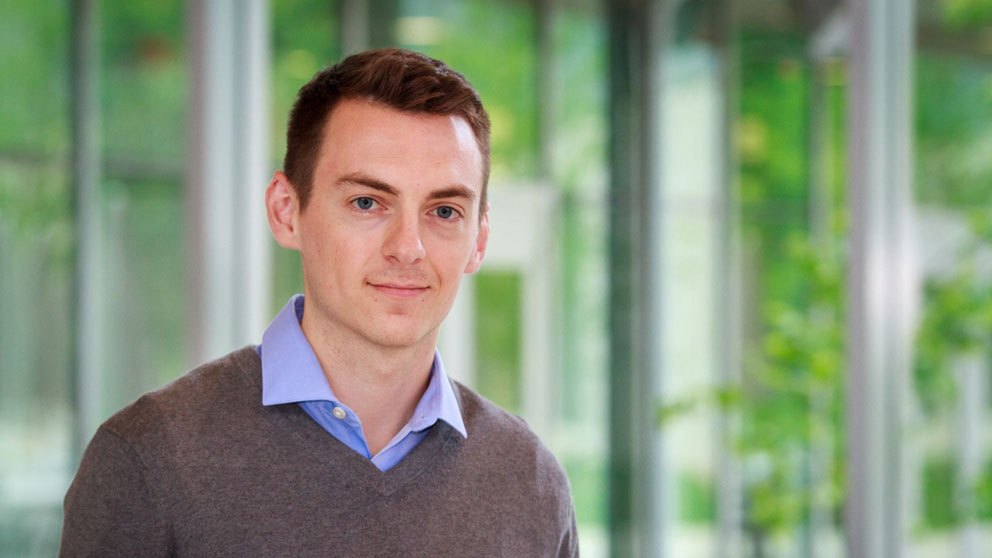 Photo by Jared Skolnick
Photo by Jared SkolnickMelanie Sinche, Director of Education at The Jackson Laboratory for Genomic Medicine, talked with Kevin Johnson, Ph.D., a JAX postdoc in the Verhaak lab and recent recipient of the prestigious American Cancer Society Postdoctoral Fellowship Award.
Q: Tell me a bit about your background.
A: I’m a New England native, and have spent my entire life here. I grew up in Springfield Massachusetts, 45 minutes up Interstate-91. For college, I went to the University of Massachusetts Amherst, also on I-91. Coincidently, I remained on the 91 corridor and traveled two hours north to Dartmouth for my PhD, where my research interests expanded into molecular medicine. My primary focus was on the development of biomarkers for pre-invasive and invasive breast cancer. To accomplish this, I integrated clinical data with a variety of molecular features to learn more about the development and progression of breast cancer. Toward the end of my PhD, an opportunity arose to study a recently discovered DNA modification, 5-hydroxymethylcytosine, which I discovered is an important marker in aggressive brain tumors. This project got me excited about brain tumor biology. I ended up landing a great postdoc with Roel Verhaak, Ph.D., a world leader in brain tumor genomics at the University of Texas MD Anderson Cancer Center. I was finally ready to break out of my New England bubble by moving to Houston. About a month after I decided, there was a change to the Jackson Laboratory for Genomic Medicine. So I just ended up just driving south back down I-91!
Q: What are you looking at here at JAX?
A: The project I proposed was to investigate the defects in the cellular machinery of glioma, a type of adult brain tumor. One of the distorted molecular features of gliomas is faulty epigenetic regulation. [Broadly, epigenetics are those modifications to DNA that dictate whether genes are turned on and off.] I am particularly interested in how the glioma epigenome contributes to disease progression by studying both the primary tumor and the recurrent tumor at the single cell level. This will yield unprecedented knowledge about the evolutionary course of individual cells within a brain tumor, and provide insight into potential treatment options for cancer patients.
Q: When did you decide to apply for your own funding?
A: The first thing I did at JAX was to create a vision for my postdoctoral training. I mapped out a strategy using a career Individual Development Plan, and made it my primary objective to write a fellowship proposal. With support from my adviser, I took the necessary time during the first few months of my postdoc to generate a hypothesis, cultivate this idea, and work with the Scientific Professional Development (SPD) office to flesh it out. I worked closely with Sara Cassidy on the JAX writing team improving the content during several iterations, and submitted my application to multiple funding agencies. The American Cancer Society was the agency that ultimately funded the application.
Q: Who is going to fund this work and what are your responsibilities?
A: The American Cancer Society (ACS) New England donor group provided a three-year award. During this time, I am committed to delivering on the specific aims outlined in my proposal and will attend an annual seminar of ACS scholars. I will also become involved with other ACS events including fundraising like the Relay for Life and meetings that promote interactions with patient advocates.
Q: What does the fellowship provide?
A: The fellowship is designed to support my salary and a small budget for scientific conference travel. The money allotted for travel will enable me to present the work, receive constructive feedback, and communicate it to the general public. This is crucial to the broader mission of ACS.
Q: What are your future goals?
A: Like many, I feel both excited and overwhelmed by the vocational variety afforded to PhDs in the life sciences. During my PhD, my career goals oscillated between leading an academic research lab and jettisoning academics for an industrial job. Now with research support, I find myself pivoting back towards a career in academic research.
Q: What do you like most about a career in science?
A: You get paid to learn. You get paid to teach yourself. Your vocation is to learn and help others learn about the world. If you enjoy being a student and a life-long learner, becoming a scientist is a great option. You continually push your knowledge boundaries, and I have found great meaning in testing new hypotheses.
Q: Where do you see cancer research going next?
A: At this point, the trend is to make cancer biology more translational. What this means is that we, as scientists, need to work closely with clinical collaborators to familiarize ourselves with the important barriers in cancer detection and treatment. The research that directly addresses the clinically tractable questions has also been more likely to be funded. As a field, we have done a fantastic job characterizing the defects that exist in cancer cells. The next steps are to begin to identify those alterations responsible for driving the disease, and how can we target these defects. These are both areas that our lab is actively investigating here at JAX.
Q: What do you like most about working at JAX?
A: I really appreciate and recognize the opportunities here for collaboration. I work closely with members of the Single Cell Biology group, and our lab has joint meetings with the Chuang and Li labs. In general, there is a certain closeness that happens with a smaller organization. People here take pride in their community and actively participate in events.
Kevin C. Johnson, PhD, is supported by an American Cancer Society – New England Pay-if Postdoctoral Fellowship (PF-17-141-01-DMC).